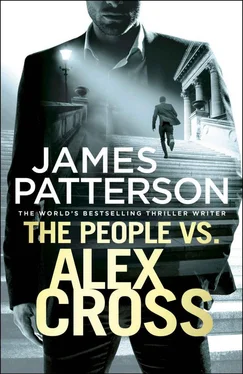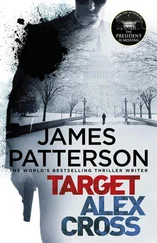“No one’s putting me in a psych ward,” Aaliyah said, getting to her feet angrily. “Least of all me.”
“Tess—”
“Sorry,” she said, heading for the door. “I thought I could trust you and I was wrong. Good-bye, Dr. Cross.”
After a long look at the situation I came to a decision, grabbed my jacket, went outside, and hailed a cab.
We pulled up in front of the DC Police Union building twenty minutes later. I paid the cabbie, went inside, and asked to see William Roth.
Did I have a meeting set up with Mr. Roth? the receptionist asked. No. Had I tried to call him? I’d thought it was a dire enough situation to come down to talk with Mr. Roth in person. It wasn’t until I told him it might be a matter of life and death that he called upstairs.
Mr. Roth was in an important meeting, the receptionist told me after hanging up the phone.
“You didn’t explain the gravity of the situation. Call back.”
The receptionist rolled his eyes, snatched up the phone again, and dialed. “He says break into the meeting. It’s that important,” he told someone.
The receptionist waited, waited, and then hung up and said, “Go on up, third floor, second door on the right. Roth’s not happy.”
“I don’t care,” I said, and I took the stairs up.
I knocked on the door and then entered an anteroom with a very irritated secretary at her desk. “Mr. Roth has been working for this meeting for six months,” she said.
“Would it matter if someone you cared about was in danger?”
“Well,” she said, flustered. “I suppose so.”
“Where’s Roth?”
“Roth’s right here,” said a flushed, bald man who appeared in the open doorway behind the secretary. “This better be good. I’ve got people at the table I never expected to—”
“It’s Tess Aaliyah,” I said, walking past the secretary into Roth’s office. “You’re her rep, correct?”
“Aaliyah?” Roth said with mild disdain. “Dear God, what’s she done now?”
“You sent her to me this morning for an evaluation. I believe she’s depressed and possibly suicidal.”
“No,” Roth said, taking a seat at his desk. “I saw her last week. She was bummed but knew it wasn’t her fault that the little girl was playing in the front hall before the shooting started.”
“I don’t think Aaliyah cares. About anything. Which can be chemical, and which is why I need your help getting her into a psych ward for three days so she can be evaluated by medical professionals.”
“You want me to commit Aaliyah?” Roth said incredulously. “No, absolutely not. Even if I had that authority, and I don’t, absolutely not.”
“Aren’t you supposed to look after her, represent her?”
“In the shooting, yes, but this? No.”
“The depression and suicidal thoughts followed from the shooting,” I said firmly. “She needs help. More than I can give her.”
“You tell her that?”
“I did.”
“What did she say?”
“That she was upset but fine and nowhere near the padded room.”
“There you go, then,” Roth said, getting up. “I have a meeting to run.”
I blocked the door and said, “You don’t care about Aaliyah’s well-being?”
“I care,” Roth said. “But if you want her in a psych ward, convince her doctor or someone in her family to recommend it. Or get the department to make it a stipulation of her suspension revocation. Any way you try to do it, though?”
“Yes?”
“Expect her to fight.”
After several unsuccessful attempts to reach her, I spoke with Esther Dodd, an attorney for the police department. It was obvious by her curtness that Ms. Dodd was none too happy to take my call, probably due to the murder charges pending against me. She listened impatiently and dismissed out of hand my request to have Aaliyah undergo psychiatric evaluation as soon as possible as a stipulation of her rejoining the force.
“She’s on suspension with a lawsuit pending,” the attorney said. “That puts Detective Aaliyah in limbo and gives us very few options, especially since your evaluation was done on behalf of the police union. With all due respect, it holds no weight from a legal perspective. Good-bye, Dr. Cross.”
I tried to find Aaliyah’s doctor next and lucked out when a friend in the human resources department checked some old records and gave me a name, Dr. Timothy Cantrell. I looked Cantrell up and found he was not only an internist but affiliated with GW Medical Center and its famous tropical medicine division. I called Cantrell’s office but found that the physician, a member of Doctors Without Borders, was currently out of the country, working in Brazil to stem a yellow fever outbreak.
I was frustrated but refused to give up without making every effort.
At 2:12 p.m., after making the long drive, I turned down Francis Street in the small town of Arbutus, a suburb of Baltimore, and soon found a small blue-and-white bungalow with a neatly tended yard.
A raw northeast wind had picked up and caused me to shiver as I ran up the walk and knocked at the door. A tall and very put-together redheaded woman in her late fifties answered the door.
I introduced myself, and her features softened.
“I’ve seen you on the news,” she said. “Tess and Bernie say you’re innocent, wrongfully charged.”
Her name was Christine Prince. She was Aaliyah’s father’s girlfriend and was happy to tell me that Bernie had gone off surf-fishing, his passion in retirement. I asked when he’d return, and she said that he’d gone to one of his favorite spots out on Assateague Island, so he probably wouldn’t be back until around midnight.
After a few moments’ hesitation, I asked if she knew where on Assateague he went to fish.
“You’re going all the way out there?” she said after showing me on a map.
“I need his advice, and I think he’d want to give it to me sooner rather than later.”
“Tess?” she said softly.
“You’re a mind reader, Christine,” I said. “Thank you for the help.”
Two hours later, I pulled into Assateague Island State Park. The ranger station was closed, and I found Bernie Aaliyah’s Jeep Wagoneer parked right where his girlfriend said it would be.
When I got out, the wind clipped me, and the sky spat rain. I dug in the trunk of my car and came up with an old rain jacket and a pair of calf-high rubber boots I kept around for crime scene work. I put them on, and with my hood up to block the wind, I walked up the trail, through the dunes, and onto the beach.
The Atlantic was gray and roiling. But to my left, there were surfers out on the swells, clad head to toe in black neoprene, and to my right, there were six or seven anglers. I stood there, looking at the anglers one at a time, until I saw an older man limp fast toward the crashing surf and then use his powerful shoulders to whip out a heavy fishing rod with a big pink lure.
I thought the lure’s arc would die quickly in the wind, but it had just the right angle, and it punched through, landing in the water far offshore. As I started toward him, he pumped the rod tip up and down several times, paused, then did it again. When I passed his chair, his cooler, his tackle box, and two Coleman lanterns yet to be lit, he twitched it a third time.
“Bernie Aaliyah?” I said.
The old man startled and looked over his shoulder at me, huddled in my rain jacket and hood. “I know you?” he said.
I pushed back the hood. “Alex Cross, sir.”
Tess’s father’s face broke into a toothy smile. “So you are. Been a long time, Dr. Cross. I’ve been following your career from way back.”
Читать дальше












